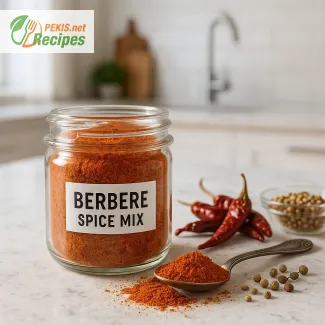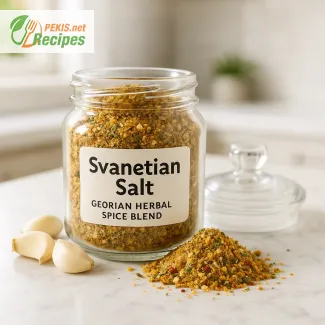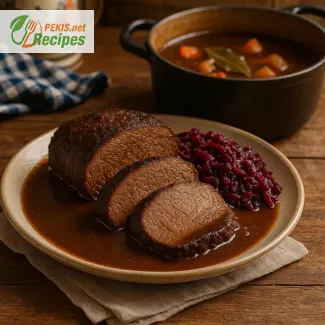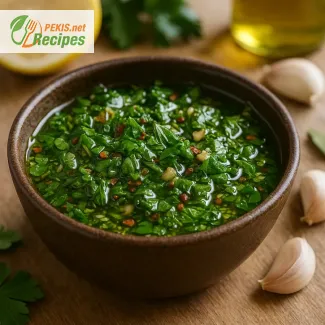Berbere spice mix makes about 12 servings and comes together in just 10 minutes of prep and 5 minutes of toasting. This authentic Ethiopian blend combines chili peppers, paprika, ginger, and fenugreek to create a warm, smoky, and aromatic seasoning that transforms meats, vegetables, and stews. Its vibrant red color and deep heat add a bold flavor to everyday dishes. Stored in an airtight jar, it stays fresh for up to 6 months, keeping your kitchen stocked with the essence of Ethiopian cuisine.
Years of working with spice blends have shown how a perfect balance of heat and aroma can turn simple food into something memorable. Berbere spice mix is one of those rare combinations where every ingredient — from chili peppers to cardamom — plays its part in building a deep, layered flavor. The key lies in gently toasting the spices until their fragrance fills the air, unlocking the warmth that defines Ethiopian cooking.
PEKIS – a professional chef and recipe developer with over 25 years of experience in cooking and baking, specializing in European and international cuisine.

The Rich Heritage and Fiery Aroma of Ethiopian Berbere
A deep dive into one of Africa’s most aromatic spice blends
The Berbere spice mix captures the soul of Ethiopian cuisine — a vibrant, complex blend of heat, aroma, and depth that defines countless traditional dishes. Its fiery red color, smoky undertone, and sweet-earthy warmth create a balance unlike any other spice blend in the world. From the moment it meets a hot pan, Berbere releases a burst of fragrance that transforms simple ingredients into rich, comforting meals with a hint of exotic mystery.
Berbere is more than a spice; it’s an expression of cultural identity and centuries of culinary tradition. The blend typically includes chili peppers, paprika, ginger, fenugreek, cardamom, coriander, clove, cumin, and allspice, though every family or region adds its own twist. This diversity gives Berbere its unique signature — one that evolves from village to village, cook to cook. In Ethiopia, preparing Berbere is almost a ritual, passed down through generations as a way of preserving heritage through flavor.
Origins and historical essence of Berbere
The roots of Berbere stretch back to the Horn of Africa, where spice trade routes shaped local cuisines for centuries. Influenced by traders from Arabia and India, Ethiopians developed their own blend to complement staple dishes like Doro Wat, Misir Wat, and Injera. The word “Berbere” itself comes from the Amharic term for “hot,” symbolizing not just its spice level but the warmth it brings to both food and gatherings.
Historically, preparing Berbere was an event — families would gather during the dry season to grind and toast each spice by hand. The process filled the air with sweet, pungent, and peppery notes, marking the start of festive cooking seasons. Even today, Berbere is regarded as the beating heart of Ethiopian kitchens — a blend that represents unity, time, and tradition.
The power of each ingredient
Each component in Berbere serves a purpose. Chili peppers bring the heat and color, paprika adds smokiness, while ginger and cardamom introduce warmth and depth. Fenugreek adds a slightly sweet, nutty aroma that rounds out the sharper edges of chili, and coriander brightens the overall profile with citrusy freshness. When combined, these spices create a harmonious flavor symphony that is both bold and balanced.
The secret lies in toasting. Gently heating the spices unlocks their volatile oils, deepening color and intensity. The aroma becomes richer, and the resulting blend carries a flavor that is warm yet fiery, sweet yet tangy, and unmistakably Ethiopian.
Why you’ll love this spice mix
- Incredible versatility – Works beautifully with meats, legumes, vegetables, or grains.
- Authentic flavor – Brings a true Ethiopian touch to your cooking.
- Aromatically powerful – Fills your kitchen with exotic warmth and depth.
- Easy to customize – Adjust the heat or sweetness to your taste.
- Perfect for meal prep – A small batch lasts weeks and enhances countless dishes.
Storage and make-ahead preparation
Homemade Berbere can be stored in an airtight glass jar, away from sunlight and moisture. Its vibrant red hue and potency can last up to six months when properly sealed. For best flavor, grind whole spices just before mixing — this preserves the natural oils and complexity of the blend. If preparing in advance, portion small amounts for regular use to prevent loss of aroma.
Creative uses and variations
Berbere is traditionally used in stews and sauces, but its versatility reaches far beyond Ethiopian cuisine. Sprinkle it over roasted vegetables, stir into yogurt-based marinades, or mix with olive oil for a quick spicy rub on chicken, lamb, or tofu. Add a pinch to soups, grain bowls, or homemade dips for a subtle, intriguing warmth.
For a modern twist, pair it with cocoa or coffee powder to create a smoky-sweet crust for grilled meats. Or combine it with honey and lemon for an unforgettable glaze on roasted carrots or sweet potatoes. Each version tells its own story — a journey from the highlands of Ethiopia to your kitchen.
Flavor pairing insights and sensory notes
Berbere blends harmoniously with garlic, onions, and tomatoes, creating the foundation for countless Ethiopian dishes. Its sweet and smoky aroma also complements lentils, chickpeas, and root vegetables. When paired with creamy textures — like coconut milk or yogurt — it mellows into a luxurious, velvety flavor profile that’s deeply satisfying.
The spice’s complexity can also elevate Western-style recipes: add it to barbecue sauces, burger patties, or even chocolate desserts for a daring culinary experiment. The combination of heat, sweetness, and depth transforms any dish into a flavor experience that lingers on the palate.
Culinary essence and modern connection
In a world where cuisines increasingly blend and evolve, Berbere stands as a timeless reminder of how deeply flavor connects us to culture. It brings warmth, depth, and identity to dishes — a celebration of Ethiopia’s culinary spirit. Using it at home not only expands your flavor palette but also honors an ancient tradition that has traveled across continents.
The spice mix embodies everything we seek in modern cooking: authenticity, intensity, and adaptability. Whether used as a dry rub, a stew base, or a creative seasoning for fusion recipes, Berbere offers a sensory experience that is both ancient and new. Its enduring appeal lies in its ability to turn simple ingredients into something extraordinary, inviting you to explore a world of vibrant aromas and bold taste — one spoonful at a time.
- Toast the dried chili peppers in a dry skillet over medium heat for 2–3 minutes until fragrant, being careful not to burn them. Allow them to cool completely.
- In the same pan, lightly toast the fenugreek, coriander, cumin, and cardamom for 1–2 minutes to release their essential oils and deepen their aroma.
- Grind the toasted spices together with the cooled chilies using a spice grinder or mortar and pestle until fine and uniform.
- Add the remaining pre-ground spices — paprika, cinnamon, ginger, allspice, black pepper, cloves, garlic powder, onion powder, and salt.
- Mix thoroughly until the blend is evenly colored and aromatic.
- Transfer to a clean, airtight glass jar. Store in a cool, dark place away from moisture. The mix remains fresh and fragrant for up to 6 months.
FAQ questionWhat is Berbere spice mix used for?
Berbere spice mix is mainly used in Ethiopian and Eritrean cuisine to flavor stews like Doro Wat and Misir Wat, but it also works beautifully as a dry rub for meat, in roasted vegetables, lentil dishes, and even in marinades with yogurt or oil. Its combination of heat, smokiness, and warm aromatics makes it ideal for dishes that cook longer and need depth of flavor.
FAQ questionIs Berbere always spicy?
Berbere is traditionally medium to hot, because dried chili peppers form the base of the blend. However, the heat can be adjusted at home by using milder chilies, reducing the amount of chili, or adding a bit more paprika and coriander for sweetness. The goal is to keep the aromatic profile (ginger, cardamom, fenugreek) while balancing the burn.
FAQ questionCan I make Berbere without fenugreek?
Yes, but fenugreek adds a distinct sweet-nutty note that rounds off the sharpness of the chilies. If fenugreek is not available or you want to avoid potential legume-related reactions, you can replace it with a small amount of mustard powder or a pinch of maple sugar to mimic that gentle sweetness. The mix will still taste Ethiopian-inspired if the core warm spices remain.
FAQ questionHow do I store homemade Berbere?
Store it in an airtight glass jar, away from light, moisture, and heat. Properly stored, the spice mix stays fragrant for up to 6 months. Because it contains toasted spices, exposure to air will slowly dull the aroma, so it’s best to make a medium batch and use it regularly. Always use a dry spoon to avoid clumping.
FAQ questionWhat can I pair Berbere with outside Ethiopian dishes?
Berbere is excellent in roasted chicken, sheet-pan vegetables, tomato-based soups, bean stews, and even in homemade burger patties for a smoky-spicy twist. It also pairs surprisingly well with sweet elements like honey or roasted carrots, because the warm spices (cinnamon, allspice, cardamom) harmonize with natural sweetness.
FAQ questionWhy toast the spices before mixing?
Toasting activates the essential oils in the spices, making the final blend more aromatic, deeper, and fuller in flavor. This step is especially important for spices like coriander, cumin, and fenugreek, which develop a richer, slightly nutty character when heated. It also helps the mix resemble authentic Ethiopian-style Berbere, which is traditionally made from freshly processed spices.
The essence of Berbere spice mix lies in its ability to connect tradition, aroma, and creativity in a single spoonful. Every pinch tells a story — from the red heat of chilies to the sweet balance of cinnamon and cardamom. When used in stews, sauces, or grilled dishes, it adds warmth and depth that elevate even the simplest meals into something extraordinary.
Its versatility makes it a perfect addition to modern kitchens. Whether sprinkled over roasted vegetables, blended into marinades, or stirred through soups and grains, Berbere brings an unmistakable Ethiopian signature that works beautifully in both traditional and fusion recipes. The balanced mix of smoky, spicy, and aromatic notes lets you explore global flavors while keeping each dish comforting and familiar.
Homemade Berbere allows full control over intensity and freshness, ensuring that every batch reflects your own taste. Preparing it in small amounts preserves the natural oils and colors, maintaining that powerful scent each time the jar is opened. Stored properly, it remains vibrant and aromatic for months, always ready to bring life to your cooking.
Berbere continues to inspire chefs and home cooks around the world because of its deep cultural roots and timeless flavor harmony. From Ethiopia’s traditional stews to contemporary plant-based dishes, its influence crosses borders, reminding us that the best seasonings are those crafted with patience, history, and passion.
Allergens present in the recipe:
- Fenugreek: may cause allergic reactions similar to peanuts or chickpeas.
- None of the other ingredients contain gluten or common allergens.
Suggestions to remove allergens and gluten:
- Replace fenugreek with maple powder or mustard seed powder for a similar sweetness and depth without triggering legume allergies.
- All other ingredients are naturally gluten-free and safe for celiac diets.
- Vitamin A (µg): 420 – supports vision and immune function.
- Vitamin C (mg): 2.8 – enhances iron absorption and boosts immunity.
- Vitamin B6 (mg): 0.14 – contributes to energy metabolism.
- Iron (mg): 1.2 – essential for red blood cell production.
- Magnesium (mg): 12 – supports muscle and nerve function.
- Potassium (mg): 95 – regulates fluid balance and heart rhythm.
- Calcium (mg): 18 – maintains strong bones and teeth.
- Capsaicin (mg): 2.1 – anti-inflammatory and metabolism-boosting properties.
- Curcumin (mg): 0.4 – protects cells from oxidative stress.
- Cinnamaldehyde (mg): 0.6 – helps balance blood sugar levels.
- Flavonoids (mg): 5.5 – contribute to heart and vascular health.
- Polyphenols (mg): 12 – support cellular protection and longevity.





